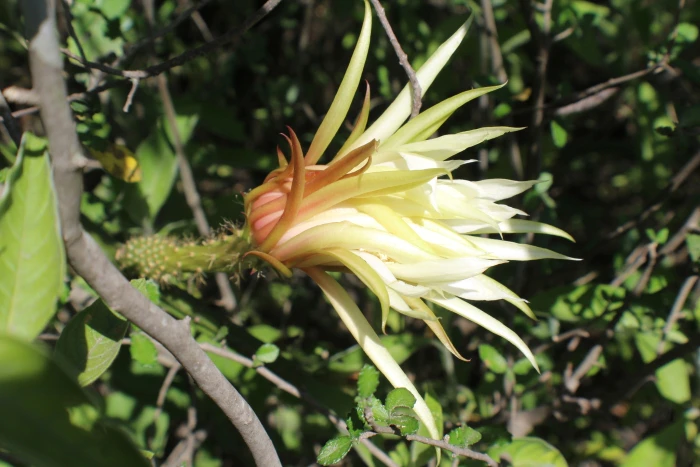Vine-Like Moonlight Cactus
(Selenicereus spinulosus)
Vine-Like Moonlight Cactus (Selenicereus spinulosus)
/
/

© Francisco Martínez González
CC BY-SA 4.0
Image By:
© Francisco Martínez González
Recorded By:
Copyright:
CC BY-SA 4.0
Copyright Notice:
Photo by: © Francisco Martínez González | License Type: CC BY-SA 4.0 | License URL: http://creativecommons.org/licenses/by-sa/4.0/ | Uploader: yoshito_fm | Publisher: iNaturalist |

























Estimated Native Range
Climate Requirements for Raymore, Missouri
| This Plant | Your Site | Plant Suitability for Your Location | ||
|---|---|---|---|---|
| • Precipitation | 13" - 144" | 40" | Aquatic | Aquatic |
| • High Temp. | 75°F - 98°F | 89°F | Your summer temperatures are normal for this plant. | Excellent |
| • Low Temp. | 34°F - 72°F | 17°F | Your winter temperatures may be too cold for this plant | Too cold |
This plant may not grow well at your location - your precipitation is too high.
Summary
Selenicereus spinulosus, commonly known as vine-like moonlight cactus, is a perennial, climbing cactus native to rocky and arid regions of eastern Mexico and is also found in the lower Rio Grande Valley of Texas. It typically inhabits sun-exposed limestone outcrops, where it uses other plants as support to gain access to light. This species can reach substantial lengths as it climbs, with scandent stems that feature 4-6 ribs and are adorned with small, acicular spines that provide a distinctive texture.
The vine-like moonlight cactus is notable for its nocturnal flowers, which are variable in size, ranging from 3-6 inches long, and exude a captivating fragrance. These blooms open at night and can remain open for 2-3 days, showcasing their white to pale yellow coloration. The plant’s preference for full sun, light watering, and well-drained soils makes it a suitable candidate for rock gardens, xeriscaping, and as an ornamental in warm climates. It is easy to cultivate and flowers readily, making it a rewarding choice for gardeners interested in night-blooming species. While it is generally free from serious pests and diseases, overwatering can lead to root rot, so proper soil drainage is crucial. Additionally, as a climbing cactus, it may require support structures when grown in cultivation to mimic its natural growth habit.CC BY-SA 4.0
The vine-like moonlight cactus is notable for its nocturnal flowers, which are variable in size, ranging from 3-6 inches long, and exude a captivating fragrance. These blooms open at night and can remain open for 2-3 days, showcasing their white to pale yellow coloration. The plant’s preference for full sun, light watering, and well-drained soils makes it a suitable candidate for rock gardens, xeriscaping, and as an ornamental in warm climates. It is easy to cultivate and flowers readily, making it a rewarding choice for gardeners interested in night-blooming species. While it is generally free from serious pests and diseases, overwatering can lead to root rot, so proper soil drainage is crucial. Additionally, as a climbing cactus, it may require support structures when grown in cultivation to mimic its natural growth habit.CC BY-SA 4.0
Plant Description
- Plant Type: Succulent
- Height: 30-10 feet
- Width: 1-2 feet
- Growth Rate: Moderate
- Flower Color: Pink, White
- Flowering Season: Spring, Summer
- Leaf Retention: Evergreen
Growth Requirements
- Sun: Part Shade
- Water: Low
- Drainage: Fast
Common Uses
Low Maintenance, Potted Plant, Showy Flowers
Natural Habitat
Native to rocky and arid regions of eastern Mexico and the lower Rio Grande Valley of Texas
Other Names
Common Names: Climbing Cactus, Vine-Like Moonlight Cactus, Pitayita-Nocturna Espinosa, Princess of the Night
Scientific Names: Selenicereus spinulosus, Cereus pseudospinulosus, Cereus spinulosus, Mediocactus spinulosus, Selenicereus pseudospinulosus
GBIF Accepted Name: Selenicereus spinulosus